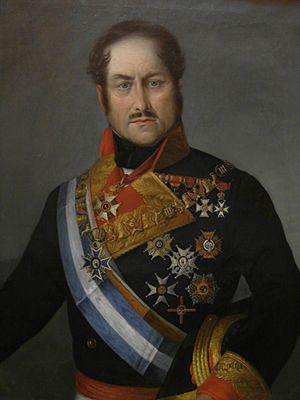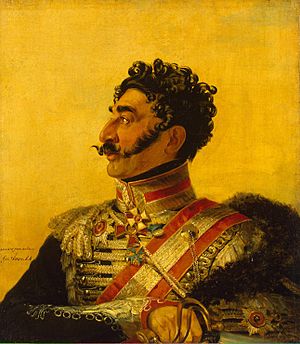Juan Van Halen facts for kids
Juan Van Halen y Sartí (born February 16, 1788 – died November 8, 1864) was a Spanish military officer. He was known for his exciting life as a soldier and adventurer across Europe. After fighting in the Peninsular War, he had to leave Spain. He even spent about 18 months as a colonel in the Russian army before Tsar Alexander I of Russia removed him.
Early Life and Military Start
Juan Van Halen was born in Isla de León, a town in Cádiz, Spain. His family were sailing merchants. He went to special schools for nobles and royal pages. There, he met important people like José María Torrijos. From 1800 to 1803, Juan was a student at the Navy School in Cádiz.
In 1803, he left Cádiz as a cadet in the Spanish Navy. He sailed on a ship called Anfitrite to places like La Habana, Cuba and Veracruz, Mexico. In 1808, Juan started working for Joseph Bonaparte, who was the French King of Spain at the time. He even helped him when he had to go to France in 1813.
In 1814, Van Halen switched sides and joined the opposing army. He used a clever trick: he faked the signature of a French general named Louis-Gabriel Suchet. He sent fake documents telling French commanders to give up their forts because the war was supposedly over. About 1,900 French soldiers in Lleida, Mequinenza, and Monzón believed the trick and surrendered. However, the commander at Tortosa was not fooled and kept fighting.
When Captain Van Halen returned to Spain in 1815, he was investigated for his actions during the Spanish War of Independence. He was later put in prison in 1817 because of his connections to certain groups. He also knew General José María de Torrijos y Uriarte, who was later executed.
An Adventurous Journey
After escaping from prison, Van Halen traveled to Saint Petersburg, Russia, in early 1819. He met important Russian leaders, including Prince Pyotr Mikhailovich Volkonsky, who was a close advisor to Tsar Alexander I. He also visited Prince Dmitriy Vladimirovich Golitsyn, a brave general who governed Moscow for many years.
Van Halen also met Augustíne de Betancourt, a famous Spanish engineer who helped start Russia's first Engineering Academy School. With Betancourt's support, Van Halen became a colonel in the Caucasus Dragoon Regiment in Tbilisi, Georgia.
He served under General Aleksey Petrovich Yermolov and Armenian prince Valerian Madatov. He fought in a battle on June 21, 1820, against the troops of Surghai Khan in the Daghestan region. For his bravery, he received the medal of the Russian Order of St. George. In 1854, Van Halen gave a special knife he had taken in battle to the Naval Museum of Madrid.
Because of Van Halen's strong beliefs in freedom and change, the tsar's secret police became suspicious. In December 1820, the tsar removed Van Halen from the Caucasus region. In 1821, he went back to Spain during a time of political change called the Trienio Liberal. When this revolution was stopped by other European kingdoms, he moved to Matanzas, Cuba, for three years. He also did business in New York and Philadelphia during this time.
In 1830, Van Halen went to fight against the Netherlands. He helped in the Belgian Revolution, which led to the creation of the new country of Belgium.
In 1831, he formed a group of Belgian soldiers to help defend Portuguese liberals. These were people who wanted more freedom and were being treated badly by the king, Miguel I of Portugal. This effort was paid for by a Spanish businessman named Juan Álvarez Mendizabal.
Van Halen also took part in the First Carlist War in Catalonia, Spain. He fought under generals like José María Torrijos and Francisco Espoz y Mina.
He returned to Spain in February 1833 after King Fernando VII died. However, he continued to travel and made short visits to Belgium and England between 1835 and 1838.
Van Halen was very close to General Baldomero Espartero. When Espartero faced problems in 1843, Van Halen joined him in exile in England.
He returned to Madrid in 1854 and received a high honor called the Great Cross of King Carlos III on November 30 of that year.
Juan Van Halen married Maria del Carmen Quiroga y Hermida in 1821. She passed away in 1859. Later, he married Clotilde Butler y Abrines, whose father was a Spanish Navy captain.
Juan Van Halen died in El Puerto de Santa María, Cadiz, Spain, when he was 76 years old.
Honors
- 1854: Knight Grand Cross in the Order of Charles III.
See also
In Spanish: Juan Van Halen y Sartí para niños
 | Lonnie Johnson |
 | Granville Woods |
 | Lewis Howard Latimer |
 | James West |



